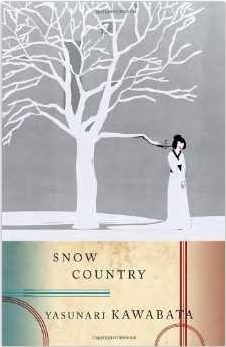 Perhaps I did not spend enough time considering Snow Country, because I kept feeling as if I was missing something. I couldn’t figure out if this problem was cultural or more an issue with the misogyny of the 1950’s, when it was written.
Perhaps I did not spend enough time considering Snow Country, because I kept feeling as if I was missing something. I couldn’t figure out if this problem was cultural or more an issue with the misogyny of the 1950’s, when it was written.
The novel follows the affair of Shimamura, an effete and sophisticated intellectual, with Komako, a simple country girl who during the novel becomes a geisha. Part of my initial problem had to do with understanding the implications of being a geisha. After all my prior reading lead me to believe that a geisha is different and in fact higher in status than a prostitute, I had to read the introduction to understand that in these hot springs villages, at least in the time the novel is set, a geisha was essentially a prostitute.
Nevertheless, when Shimamura meets Komako, she is a geisha in training, so clearly not a prostitute. Shimamura has come down from traveling in the mountains and immediately asks the hotel clerk for a geisha. None are available, so she sends him Komako. Shimamura spends the night talking to Komako but then asks her to send him a geisha. It is clear what he wants, but he seems to think he deserves some kind of credit for “behaving well” with her, whereas I, and Komako as well, understood his request as insulting. I do not think we’re supposed to like Shimamura, and I didn’t.
We know far more about Shimamura than we do about Komako. We first encounter him on a train on the way back to Komako’s village after the affair is already started. He is struck by Yoko, a girl who is tending to a sick man. Throughout, though, he is far more interested in his fantasies around Yoko than in actually getting to know her. The essence of Shimamura’s personality comes clear when we learn that he is an expert on occidental ballet even though he has never seen a ballet performed—and prefers not to.
For her part, Komako throws herself into the affair with Shimamura even though it is clearly doomed. Although Shimamura’s behavior remains consistent and it is clear that he is incapable of love, Komako is erratic. Toward the end of the relationship she says one thing and does another, she arrives roaring drunk, and she seems to have an inexplicable love/hate relationship with Yoko, as Yoko does with her.
Of course, the future for Komako is not bright, and she becomes more dissipated as the novel progresses. Although I feel we are supposed to sympathize with her, I found her exasperating. The love affair seems sterile, and I don’t see the point of it.
But this novel is set in the cold and gray snow country. Although part of the affair takes place in other seasons, the most important scenes are in the beginning of winter, and the affair ends in the fall. A sense of isolation permeates the novel.
The writing is beautifully spare, as Kawabata is a poet. I feel it is dense in meaning, but if so, I probably missed a lot of it.

This is on my shelves and to-read list. It is interesting to read your take on it. The Japanese really do leave a lot unspoken and much is to be inferred or read between the lines, so that could be the reason behind your feeling that you may have missed out on some of the meaning. I wonder how I will interpret it. Anyway, I hope to get to it before long…
Yes, I suppose there are things they would understand about it that I don’t.